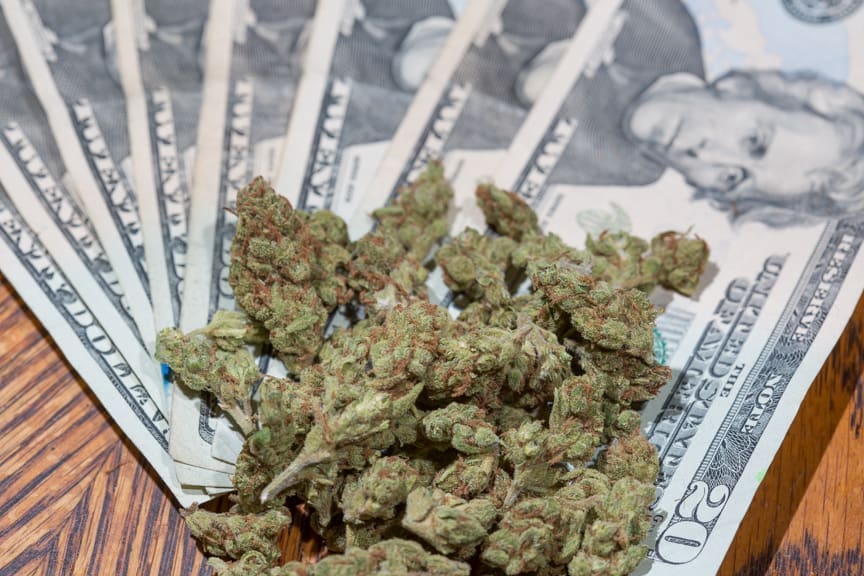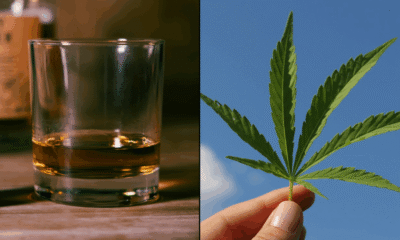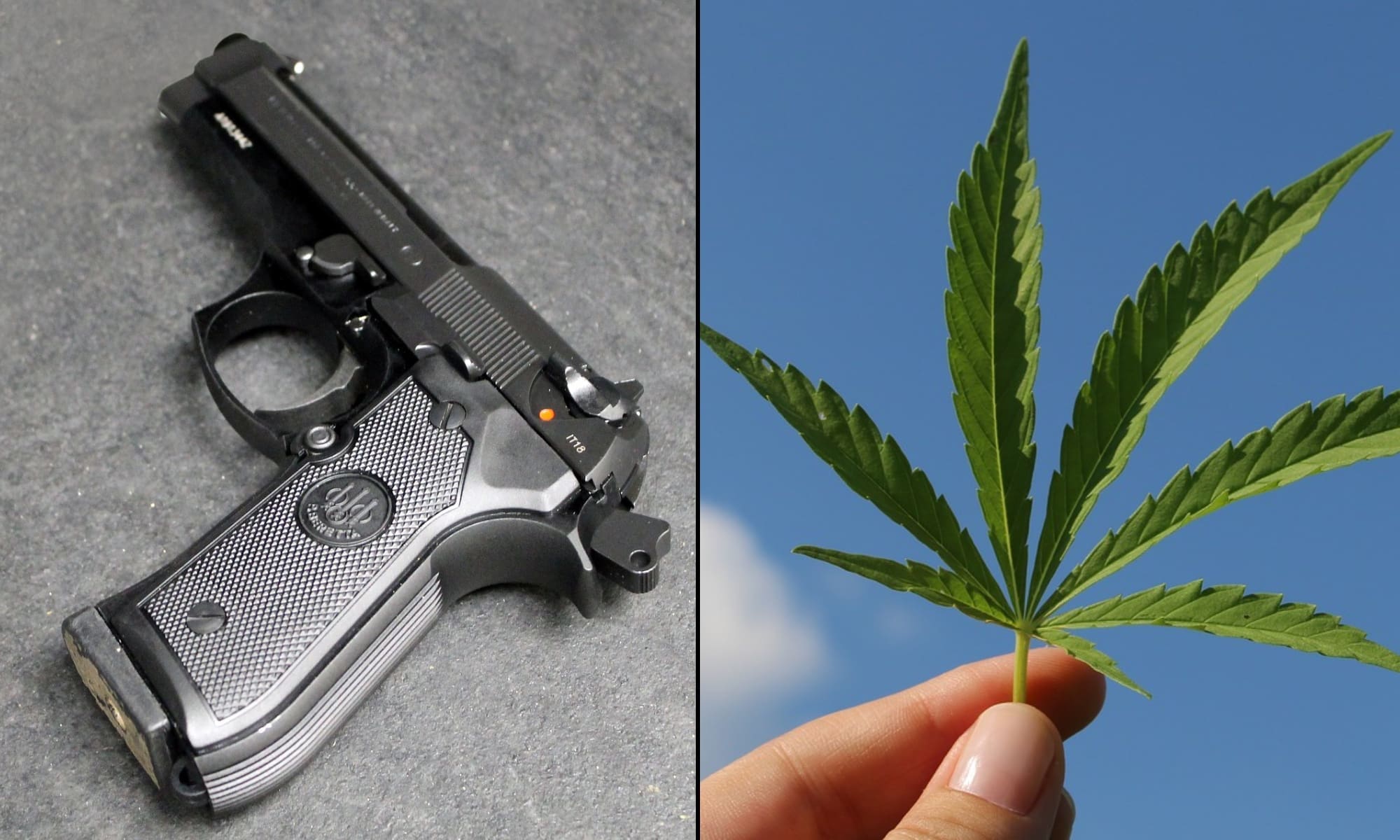featured
West Virginia Medical Marijuana Revenue Is Supposed To Support Drug Treatment Programs, But Sits Unspent As Officials Worry About Federal Prohibition
Published
8 hours agoon

“The money in the fund will remain unallocated until federal law changes.”
By Nicole Blevins, Mountain State Spotlight
This story was originally published by Mountain State Spotlight. Get stories like this delivered to your email inbox once a week; sign up for the free newsletter at https://mountainstatespotlight.org/newsletter.
Since the state’s first dispensary opened in 2021, West Virginia’s medical cannabis program has collected roughly $34 million in taxes, licensing fees and interest.
State law requires the money be used to create a medical cannabis research program, provide resources to residents with substance use disorder and fund law enforcement training.
But almost four years later, the money sits unspent.
Cannabis is still an illegal drug at the federal level. Traditional banks were unwilling to hold the state’s cannabis dollars, so they’re held at a credit union under control of the state treasurer’s office.
“The money in the fund will remain unallocated until federal law changes,” said treasurer’s office spokesperson Carrie Hodousek.
But other states with legal cannabis markets, including Maryland, Pennsylvania and Ohio, are spending their tax revenue.
A medical cannabis rollout made rocky by federal law and fearful banks
In 1970, the federal government classified marijuana as a Schedule I drug, a designation that finds it has no medical use and a high potential for misuse. Today, 40 states have legalized recreational or medical cannabis use despite the federal classification.
West Virginia’s 2017 Medical Cannabis Act allowed licensed physicians to issue medical cannabis cards to patients seeking alternative treatment for serious health conditions.
But it took over four years from the time the bill was passed for patients to get medical cannabis from a dispensary in West Virginia.
In 2018, then-Treasurer John Perdue said banks refused to hold funds from the program because they did not want to be held liable for interacting with money from an illegal substance.
Perdue sought an advisory opinion from then-Attorney General Patrick Morrisey to determine the best way to legally handle the program’s finances. Morrisey found the federal government had not gone after other states with medical cannabis markets, but there was no guarantee it would continue to refrain from doing so.
Licenses for growers, processors or dispensaries had not been dispersed by the state because there was nowhere to collect the permit fees. It wasn’t until March 2019 that lawmakers changed the state law to allow a credit union to hold the money.
Element Federal Credit Union—which was already planning to provide banking services to the state’s cannabis industry—won the bid to hold the tax dollars.
“It’s up to the individual bank if they want to take that risk. It’s a big risk because it’s federally illegal,” said CEO Linda Bodie. “We obviously took the risk.”
Former delegate and then-Republican candidate for state treasurer Riley Moore criticized Perdue for the continued delay in the program in a 2019 opinion published in the Charleston Gazette-Mail.
“Clearly, West Virginia needs a modernized, transparent and proactive state treasurer’s office,” he wrote. Moore defeated Perdue in the 2020 election.
After planting, harvesting and processing cannabis into consumable products, the first dispensary opened in November 2021 and began generating tax revenue.
During Moore’s four-year term as state treasurer, the medical cannabis program generated millions of dollars that went into the fund but were not spent. Moore, now a U.S. representative, did not respond to questions about the fund.
Lawmakers who helped write the state’s medical cannabis laws were surprised that the money is sitting at a credit union.
“I was not aware of that,” said Del. Mike Pushkin, D-Kanawha, “That’s the first I’ve heard of it, that it wasn’t being spent.”
Pushkin helped craft the 2019 cannabis banking legislation. He said there were no discussions he was involved in during that legislative session, or after, that suggested the fund would stall.
Sen. Mike Woelfel, D-Cabell, who wrote the original version of the Medical Cannabis Act, also said he wasn’t aware the money was stockpiling. After learning the status of the fund, he spoke with the current treasurer.
“I think this has come to the attention of Treasurer Larry Pack, and I think he’s summoned the experts to find a way to meet the expectations of the bill and to make this work,” Woelfel said.
As West Virginia sits on its funds, other states put cannabis taxes to use
Meanwhile, Maryland, Ohio and Pennsylvania all have legal cannabis markets and are distributing the tax revenue as it’s designated in state laws.
Ohio has distributed over $35 million to its general fund, and nearly two-thirds of the cannabis tax revenue will be allocated to its general fund beginning this fiscal year. But the rest, which goes to Ohio’s Host Community Cannabis Fund, has not been disbursed to individual municipalities due to a lack of appropriation by the state legislature, said Ohio Office of Budget and Management spokesperson Pete LuPiba.
In Pennsylvania, medical marijuana revenue has supported drug and alcohol programs and its Commission on Crime and Delinquency, said Pennsylvania Department of Revenue spokesperson Jeffrey Johnson. The state has not been able to establish a medical marijuana research program because of complications with federal law.
A third of Maryland’s cannabis tax revenue goes to a fund aimed to help communities disproportionately affected by drug use. The rest goes to the state’s general budget, counties and public health efforts.
Andrew Livingston, Director of Economics and Market Analysis at Vicente LLP, a national cannabis law firm, said he is not aware of a systemic issue where cannabis tax revenue cannot be spent in states with legal markets.
How could allocations from the fund help West Virginians now?
Woelfel introduced the Medical Cannabis Act with a key requirement to establish a medical cannabis research program. It would determine whether the medical cannabis program was helping and where it could be improved.
“To me, that was a very important part of the bill,” he said.
State Department of Health spokesperson Gailyn Markham said it has not been created due to the inability to access funds.
If West Virginia distributed the entire fund today, roughly $19 million would go back to the Bureau for Public Health within the Department of Health, nearly $8 million to the Fight Substance Abuse Fund overseen by the Department of Health, $6 million to the Division of Justice and Community Services and $1.5 million to a special revenue account for law enforcement professional training and professional development programs.
Dr. Matthew Christiansen, former state health officer from 2023-2024, said he asked but couldn’t get a clear answer of how much money was in the fund.
He said West Virginia has struggled more than any other state in the nation with addiction, and there is a lack of sustainable funding for treatment and recovery programs. Federal funding has declined, but he said the tax revenue could ease the gap.
Federal cuts include money to the Department of Justice’s Office of Justice Programs, which helped divert people with an intoxication or a possession charge into treatment instead of prison.
Christiansen said the state’s revenue from medical cannabis could be used in other ways as well.
“It’s a significant amount of money. It could be used to help quite a few people, or stand up specific programs for a period of years that would make a positive impact for people with addiction,” he said. “It’s nothing to sneeze at.”
He said this fund could also provide access to resources for the small percentage of medical cannabis patients who develop a cannabis use disorder.
Elizabeth Shahan, executive director of West Virginia Prevention Solutions, a nonprofit focused on substance use prevention, said the organization has struggled with the loss of federal funding to address the needs of West Virginians.
The West Virginia Division of Tobacco Prevention RAZE program closed this summer. It was a program aimed to educate youth about the dangers of smoking, vaping and tobacco use. West Virginia is currently leading the nation in teen vaping, according to a study conducted by Drugwatch.
“That fund alone could secure that evidence-based prevention education in school systems,” Shahan said.
Medical cannabis was brought to the state as an economic driver, she said, and businesses, prevention programs and medical cannabis patients all have a shared value to prevent harm in young populations.
“Every dollar that’s available for prevention really needs to be invested in prevention,” Shahan said. “If it sits, it doesn’t do anyone any good.”
This article first appeared on Mountain State Spotlight and is republished here under a Creative Commons Attribution-NoDerivatives 4.0 International License.![]()

Author: mscannabiz.com
MScannaBIZ for all you Mississippi Cannabis News and Information.
You may like
-


Curio Wellness Acquires 4 Greenlight Dispensaries in Missouri
-


The best places to be high in Seattle
-


Colombia’s Bold Offer to Trump: Legal Weed Exports for Peace
-


Trump DOJ Asks Supreme Court For Delayed Schedule In Case On Marijuana Users’ Gun Rights
-


Whiskey Company Scales Back Operations, Citing ‘Consumer Shifts’ Toward Marijuana As Alcohol Alternative
-


Smart Cannabis: The AI Revolution No Operator Can Ignore
featured
Curio Wellness Acquires 4 Greenlight Dispensaries in Missouri
Published
36 minutes agoon
October 23, 2025
[PRESS RELEASE] – TOWSON, Md., Oct. 22, 2025 – Curio Wellness, a leading U.S. cannabis brand and vertically integrated operator, has entered into a definitive agreement to acquire four high-volume retail dispensaries in Missouri operating under the Greenlight brand. The locations expand Curio’s best-in-class retail portfolio and presence in Southeast Missouri, increasing access to Curio products and experiences across the region. The transaction is expected to close following regulatory approval.
“Curio and Greenlight share a deep commitment to customer delight,” Curio Wellness CEO Michael Bronfein said. “These locations are exceptionally well operated and culturally aligned with our standards of operational excellence. Bringing them into the Curio family advances our mission to deliver trusted products, service and value – customer by customer, store by store, market by market.”
The acquisition aligns with Curio’s disciplined approach to capital allocation and national expansion. By integrating four high-performing dispensaries into its Missouri platform, Curio adds immediate scale, strengthens retail capabilities, and creates a broader stage for its innovative products. The transaction is expected to be accretive and deliver shareholder value through operational synergies, supply-chain efficiencies and increased brand adoption in a large and growing market.
“This acquisition represents an intentional step in our national strategy, building on market entries, franchise development, and brand partnerships designed for predictable results and sustainable growth,” Bronfein said.
“Working with Curio Wellness is a decision we make with confidence,” Greenlight CEO John Mueller said. “Curio’s commitment to people, product quality and community aligns with our values. We’re proud these locations will continue to thrive.”
Curio expects continued momentum in Q4 2025, including the launch of its branded products in New York through a licensing partnership with Vireo Health and the opening of a franchise location in New Jersey, enabled by Curio’s Private Equity Fund for Social Equity operators.
“As we integrate these Missouri locations and execute on our Q4 initiatives in New York and New Jersey, our focus remains clear,” Bronfein said. “We’re here to bring innovation, access and value to customers and stakeholders nationwide – responsibly, consistently and at scale.”
SSC Advisors acted as financial advisers on this transaction.

Author: mscannabiz.com
MScannaBIZ for all you Mississippi Cannabis News and Information.
featured
Colombia’s Bold Offer to Trump: Legal Weed Exports for Peace
Published
2 hours agoon
October 23, 2025
Colombian President Gustavo Petro opened a controversial new front line by proposing to U.S. President Donald Trump more than just a trade adjustment: he asked that “the export of cannabis be legalized like any other good, given its exclusion from the UN list of dangerous substances,” through a post on X.
Las guerras que Colombia vive desde hace 5 décadas, primero urbana hasta 1993, después rural, se deben al consumo de cocaína en EEUU; aunque han habido aportes de gobiernos estadounidenses a la paz de Colombia, han sigo exigüos y nulos en los últimos años.
Se ha construido una… https://t.co/R2SGZEnDfU
— Gustavo Petro (@petrogustavo) October 20, 2025
The idea is not limited to marijuana as an agricultural product, but rather, Petro ties it to a broader plan to transform Colombia’s rural economy: eliminating tariffs, opening long-term contracts for farmers in crop substitution areas, and attracting agro-industrial investments that will help farmers relocate “to fertile lands near cities and not adopt the jungle as a form of survival.”
For advocates of cannabis reform, the situation paints an intriguing picture: the proposal to bring a marginalized crop out of the underground, carve out a legitimate place for it in international trade and empower growers. But is it viable? What risks does it entail?
‘Colombia Provides the Money and the Deaths, the US Provides the Consumption’
The proposal comes in a context of diplomatic rift with the US. Trump accused Petro of being an “illegal drug leader” and announced, in a threatening tone, the suspension of aid and tariffs for Colombia — a country he repeatedly misnamed ‘Columbia.’
In response, Petro not only proposes the legalization of cannabis, but also shifts blame for Colombia’s conflict onto foreign consumption: “Colombia puts up the money and the deaths, and the US provides the consumption.”
This shift flips the traditional narrative—no longer ‘Colombia produces, the US consumes’—instead demanding the opening of legal markets to replace illicit ones, and make regulation part of the plan. He also called to “scientifically study whether prohibition is truly necessary, or whether instead a model of responsible, state-regulated consumption would be more effective.”
For cannabis reform advocates, this proposal can be seen as a historic demand: rural workers as protagonists, legal exports as an option, and public health as the focus. But the path is fraught with diplomatic, commercial, and regulatory hurdles.
Petro’s proposal has two powerful facets: on the one hand, it opens the door to viewing cannabis not as a stigma but as an economic, social, and political opportunity. On the other hand, it plunges headlong into a fierce battle: that of agricultural sovereignty, that of trade treaties, and the US role in the international War on Drugs.
Ultimately, if successful, it could pave the way for a new Latin American model for agro-industrial regulation: the countryside as the driving force, trade with the US as the platform, and cannabis as a legitimate product. If it fails, it could trigger harsher authoritarian drug-war crackdowns, strain alliances, and deepen global stigma.

Author: mscannabiz.com
MScannaBIZ for all you Mississippi Cannabis News and Information.
featured
Trump DOJ Asks Supreme Court For Delayed Schedule In Case On Marijuana Users’ Gun Rights
Published
3 hours agoon
October 23, 2025
The Justice Department is asking the U.S. Supreme Court for more time to submit briefs in a case justices recently agreed to hear that concerns the constitutionality of a federal ban on gun ownership by people who use marijuana and other drugs.
In a motion from the Trump administration that was sent to the court on Thursday, DOJ said there was mutual agreement between its attorneys and those representing the respondent in the case that the current deadline for briefs and reply briefs should be revised because of the “press of other cases.”
Currently, the Justice Department is supposed to file its first brief with the court by December 4, but it’s requesting that be extended to December 12. That would push the respondent’s deadline to submit a brief to January 20.
“If those extensions are granted, the reply brief would be due on February 19, 2026. Both parties consent to this briefing schedule,” U.S. Solicitor General D. John Sauer, an appointee of President Donald Trump, said in the motion.
The Trump administration has routinely argued that the policy restricting gun ownership by people who use cannabis, even in compliance with state law, “targets a category of persons who pose a clear danger of misusing firearm” and should be upheld.
After several years of conflicting lower court rulings on related cases, justices on Monday granted cert in U.S. v. Hemani to settle the question of whether the ban—known as Section 922(g)(3)—is consistent with the Second Amendment.
While the court on Monday also declined to take up a separate case on cannabis consumers’ gun rights, there are still several others pending a decision from the justices. But the choice to take up Hemani in particular is likely welcome news to the Justice Department, which has consistently defended the firearm prohibition and specifically requested that SCOTUS review that case instead of alternatives.
That could be related to the fact that the defendant is not only a marijuana consumer but also a user of cocaine who’s sold drugs in the past, so it’s possible DOJ reasoned that he is a less sympathetic face for the issue. Defendants in the other cases were merely found in possession of both a firearm and marijuana.
In June, the solicitor general submitted a filing with the Supreme Court that said “Section 922(g)(3) complies with the Second Amendment,” and the statute “targets a category of persons who pose a clear danger of misusing firearms: habitual users of unlawful drugs.”
The law “bars their possession of firearms only temporarily and leaves it within their power to lift the restriction at any time; anyone who stops habitually using illegal drugs can resume possessing firearms,” Sauer said.
Notably, while the government mentions “habitual” users of illegal drugs 40 times in its filing, that word does not itself appear in 922(g)(3). The language of the statute prohibits anyone “who is an unlawful user of or addicted to any controlled substance” from purchasing or possessing firearms or ammunition.
In a separate August filing for the case, the Justice Department also emphasized that “the question presented is the subject of a multi-sided and growing circuit conflict.” In seeking the court’s grant of cert, the solicitor general also noted that the defendant is a joint American and Pakistani citizen with alleged ties to Iranian entities hostile to the U.S., putting him the FBI’s radar.
Now that the Supreme Court has agreed to take up Hemani, if justices declare 922(g)(3) constitutional, such a ruling could could mean government wins in the remaining cases. The high court on Monday denied a petition for cert in U.S. v. Cooper, while leaving pending decisions on U.S. v. Daniels and U.S. v. Sam. The justices were scheduled to discuss all of the cases at a closed-door meeting last Friday.
The court also recently denied a petition for cert in another gun and marijuana case, U.S. v. Baxter, but that wasn’t especially surprising as both DOJ and the defendants advised against further pursing the matter after a lower court reinstated his conviction for being an unlawful user of a controlled substance in possession of a firearm.
A number of federal courts in recent years have cast doubt on the legality of § 922(g)(3), finding generally that while the ban on gun ownership among drug users may not be entirely unconstitutional, there’s scant historical precedent for such a broad restriction of Second Amendment rights on an entire a category of people.
Meanwhile, in recent interviews with Marijuana Moment, several Republican senators shared their views on the federal ban on gun possession by people who use marijuana—with one saying that if alcohol drinkers can lawfully buy and use firearms, the same standard should apply to cannabis consumers.
Separately, the U.S. Court of Appeals for the Tenth Circuit last month sided with a federal district court that dismissed an indictment against Jared Michael Harrison, who was charged in Oklahoma in 2022 after police discovered cannabis and a handgun in his vehicle during a traffic stop.
The case has now been remanded to that lower court, which determined that the current statute banning “unlawful” users of marijuana from possessing firearms violates the Second Amendment of the Constitution.
The lower court largely based his initial decision on an interpretation of a Supreme Court ruling in which the justices generally created a higher standard for policies that seek to impose restrictions on gun rights.
The ruling states that any such restrictions must be consistent with the historical context of the Second Amendment’s original 1791 ratification.
The historical analogues that the Justice Department relied on to make the case that the ban is consistent included references to antiquated case law preventing Catholics, loyalists, slaves and Indians from having guns.
The circuit court, for its part, said that “the government must show non-intoxicated marijuana users pose a risk of future danger” to support the current policy. “This inquiry, which may involve fact finding, is best suited for the district court.”
Meanwhile, in the U.S. Court of Appeals for the Eleventh District, judges recently ruled in favor of medical cannabis patients who want to exercise their Second Amendment rights to possess firearms.
As a recent report from the Congressional Research Service (CRS) explained the current legal landscape, a growing number of federal courts are now “finding constitutional problems in the application of at least some parts” of the firearms prohibition.
In a recent ruling, a three-judge panel for the U.S. Court of Appeals for the Eighth Circuit vacated a defendant’s conviction and remanded the case back to a district court, noting that a retrial before a jury may be necessary to determine whether cannabis in fact caused the defendant to be dangerous or pose a credible threat to others.
The Third Circuit separately said in a published opinion that district courts must make “individualized judgments” to determine whether 922(g)(3) is constitutional as applied to particular defendants.
—
Marijuana Moment is tracking hundreds of cannabis, psychedelics and drug policy bills in state legislatures and Congress this year. Patreon supporters pledging at least $25/month get access to our interactive maps, charts and hearing calendar so they don’t miss any developments.![]()
Learn more about our marijuana bill tracker and become a supporter on Patreon to get access.
—
Earlier this year, a federal judge in Rhode Island ruled that the ban was unconstitutional as applied to two defendants, writing that the government failed to establish that the “sweeping” prohibition against gun ownership by marijuana users was grounded in historical precedent.
A federal judge in El Paso separately ruled late last year that the government’s ongoing ban on gun ownership by habitual marijuana users is unconstitutional in the case of a defendant who earlier pleaded guilty to the criminal charge. The court allowed the man to withdraw the plea and ordered that the indictment against him be dismissed.
DOJ has claimed in multiple federal cases over the past several years that the statute banning cannabis consumers from owning or possessing guns is constitutional because it’s consistent with the nation’s history of disarming “dangerous” individuals.
In 2023, for example, the Justice Department told the U.S. Court of Appeals for the Third Circuit that historical precedent “comfortably” supports the restriction. Cannabis consumers with guns pose a unique danger to society, the Biden administration claimed, in part because they’re “unlikely” to store their weapon properly.
Meanwhile, some states have passed their own laws either further restricting or attempting to preserve gun rights as they relate to marijuana.
Recently a Pennsylvania lawmaker introduced a bill meant to remove state barriers to medical marijuana patients carrying firearms.
Colorado activists also attempted to qualify an initiative for November’s ballot that would have protected the Second Amendment rights of marijuana consumers in that state, but the campaign’s signature-gathering drive ultimately fell short.
As 2024 drew to a close, the ATF issued a warning to Kentucky residents that, if they choose to participate in the state’s medical marijuana program that’s set to launch imminently, they will be prohibited from buying or possessing firearms under federal law.
The official said that while people who already own firearms aren’t “expected to” turn them over if they become state-legal cannabis patients, those who “wish to follow federal law and not be in violation of it” must “make the decision to divest themselves of those firearms.”
Since then, bipartisan state lawmakers have introduced legislation that would urge Kentucky’s representatives in Congress to amend federal law to clarify that users of medical marijuana may legally possess firearms, though no action has since been taken on that bill.
Kentucky Gov. Andy Beshear (D) said in January that he supported the legislature’s effort to urge the state’s congressional delegation to call for federal reforms to protect the Second Amendment rights of medical marijuana patients, but the governor added that he’d like to see even more sweeping change on the federal level.

Author: mscannabiz.com
MScannaBIZ for all you Mississippi Cannabis News and Information.

Curio Wellness Acquires 4 Greenlight Dispensaries in Missouri

The best places to be high in Seattle

Colombia’s Bold Offer to Trump: Legal Weed Exports for Peace

Trump DOJ Asks Supreme Court For Delayed Schedule In Case On Marijuana Users’ Gun Rights

Whiskey Company Scales Back Operations, Citing ‘Consumer Shifts’ Toward Marijuana As Alcohol Alternative

Smart Cannabis: The AI Revolution No Operator Can Ignore

New Jersey Gubernatorial Candidates Need To Step Up For Cannabis Consumers (Op-Ed)

Millennials Are Spending Big on Luxury Travel

West Virginia Medical Marijuana Revenue Is Supposed To Support Drug Treatment Programs, But Sits Unspent As Officials Worry About Federal Prohibition

Frequent Marijuana Use Is Tied To Lower Risk Of Liver Disease From Alcohol, New Study Finds

Ohio bill to scale back cannabis legalization passed by House (Newsletter: October 23, 2025)

FDA Weighs Petition On ‘Significant Harm’ Of Marijuana Hair Testing Device’s Positive Results From Secondhand Smoke

Wisconsin Lawmakers Rally for Medical Cannabis Legalization in Committee Hearing

Massachusetts Campaign To Roll Back Marijuana Legalization Law Is ‘On Track’ To Make 2026 Ballot, Spokesperson Says

Village Farms Introduces Industry-First, One-Way Aroma Valve in Cannabis Packaging

Ohio House Passes Bill To Remove Voter-Approved Marijuana Legalization Protections And Restrict Hemp Market

Sorting Robotics Becomes Cannabis Manufacturing’s First True Systems Integrator

Wisconsin Senators Hold Hearing On GOP Leader’s New Medical Marijuana Legalization Bill

Tariffs And Visas Add To The Cannabis Industry’s Misery

Rhode Island Cannabis Chair Steps Down; Adult-Use Dispensary Awards Months Away

How America Accidentally Legalized Lab Cannabis

New Hampshire Lawmakers Announce Plans For Marijuana, Psychedelics And Hemp Bills For 2026 Session

Metrc Announces In-Person Events in New York to Prepare Licensees For Track-and-Trace Implementation

Top Rhode Island Marijuana Regulator Steps Down Ahead Of Possible Campaign For Attorney General

Alert: Department of Cannabis Control updates data dashboards with full data for 2023

Connecticut Appoints The US’s First Cannabis Ombudsperson – Yes there is a pun in there and I’m Sure Erin Kirk Is Going To Hear It More Than Once!

5 best CBD creams of 2024 by Leafly

Recreational cannabis on ballot for third time in South Dakota

EU initiative begins bid to open access to psychedelic therapies
New Study Analyzes the Effects of THCV, CBD on Weight Loss

Free delta-9 gummies from Bay Smokes

5 best autoflower seed banks of 2024 by Leafly

Discover New York’s dankest cannabis brands [September 2024]

May 2024 Leafly HighLight: Pink Runtz strain

Press Release: CANNRA Calls for Farm Bill to Clarify Existing State Authority to Regulate Hemp Products

5 best THC drinks of 2024 by Leafly

Local medical cannabis dispensary reacts to MSDH pulling Rapid Analytics License – WLBT

6 best CBD gummies of 2024 by Leafly

Curaleaf Start Process Of Getting Their Claws Into The UK’s National Health System – With Former MP (Resigned Today 30/5/24) As The Front Man

Horn Lake denies cannabis dispensary request to allow sale of drug paraphernalia and Sunday sales | News

5 best delta-9 THC gummies of 2024 by Leafly

Mississippi city official pleads guilty to selling fake CBD products

The Daily Hit: October 2, 2024

Nevada CCB to Accept Applications for Cannabis Establishments in White Pine County – “Only one cultivation and one production license will be awarded in White Pine County”

5 best THCA flower of 2024 by Leafly

Weekly Update: Monday, May 13, 2024 including, New Guide for Renewals & May Board meeting application deadline

6 best hemp pre-rolls of 2024 by Leafly

PRESS RELEASE : Justice Department Submits Proposed Regulation to Reschedule Marijuana
Trending
-

 California Cannabis Updates1 year ago
California Cannabis Updates1 year agoAlert: Department of Cannabis Control updates data dashboards with full data for 2023
-

 Breaking News1 year ago
Breaking News1 year agoConnecticut Appoints The US’s First Cannabis Ombudsperson – Yes there is a pun in there and I’m Sure Erin Kirk Is Going To Hear It More Than Once!
-

 best list1 year ago
best list1 year ago5 best CBD creams of 2024 by Leafly
-

 Business1 year ago
Business1 year agoRecreational cannabis on ballot for third time in South Dakota
-

 Business1 year ago
Business1 year agoEU initiative begins bid to open access to psychedelic therapies
-

 cbd1 year ago
cbd1 year agoNew Study Analyzes the Effects of THCV, CBD on Weight Loss
-

 Bay Smokes1 year ago
Bay Smokes1 year agoFree delta-9 gummies from Bay Smokes
-

 autoflower seeds1 year ago
autoflower seeds1 year ago5 best autoflower seed banks of 2024 by Leafly



